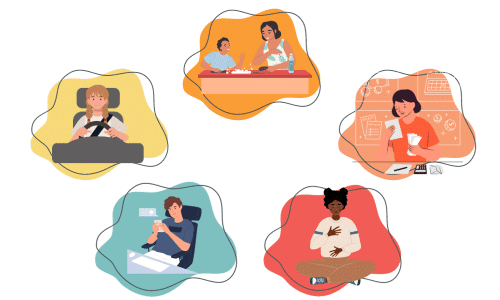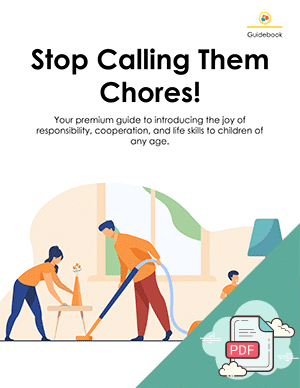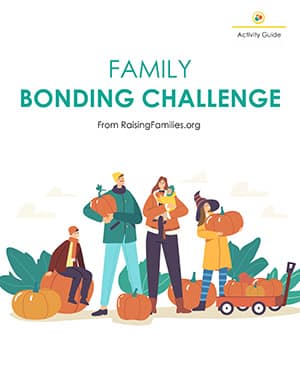- Home
- »
- Family Bonding Challenge
- »
- Teaching Life Skills to...
Teaching Life Skills to Kids in 10 Minutes or Less

Age: 2+
Time: 10 minutes or less
Materials: depends on activity
Focus: teaching life skills
Teaching life skills to kids doesn’t have to be hard or take a long time to do. Many can easily be taught quite quickly. As parents, we often think we need elaborate lessons or perfect timing to teach our children important skills, but the truth is that everyday moments offer the best learning opportunities.
Whether you’re folding laundry together on a Sunday afternoon or preparing dinner on a busy weeknight, these small windows of time can become powerful teaching moments that stick with your kids for life.
We’ve put together a list of 40 life skills according to age, many of which can be taught in under ten minutes. Pick two to three skills to teach your child this month. Before you know it, they’ll be prepared for just about anything.
As you go through the list, you’ll notice the bonus skill in each age range is the same. Of all the life skills we teach to kids, learning to manage your emotions is one of the most important. It requires constant attention and review as children grow and their brains become more sophisticated and aware.
‘Managing’ does not mean hiding or denying our feelings. Rather, it means processing those feelings in a healthy way. It means talking to trusted friends and adults and knowing that they are not alone in their feelings.
Teaching Life Skills to the Young Child
Young children are natural helpers who love to mimic what the adults around them are doing. You might recognize this tendency when you’re just trying to get the kitchen picked up or breakfast made or some other small task you could get done very quickly by yourself, that’s of course when your young child comes in and says they want to help.
Whenever possible, let them help. Yes, sometimes you have to get out the door and there’s no time to let them ramble through the process and perhaps make an even bigger mess. But that’s not always the case.
At this age, children are developing fine and gross motor skills, learning to follow simple instructions, and building confidence through completing small tasks independently. They thrive on routine and repetition, which makes this the perfect time to introduce basic household responsibilities.
While their execution might not be anywhere near perfect, the pride they feel from contributing to the family is invaluable and sets the foundation for a strong work ethic later on. Allowing your preschooler to develop their life skills and contribute to the care of their home makes them feel like they are capable and valued members of the family team, even if they can’t yet express it that way.
-
Sweeping
-
Making the bed
- Folding laundry
- Wiping down table/countertops
- Weeding
- Watering the garden/plants
- Setting the table
- Organize/put toys away
- Help care for a pet
- Get dressed/undressed
- Bonus! Manage emotions
Teaching Life Skills to Elementary School Children
Elementary-aged kids are ready to take on more complex, multi-step tasks and are developing their critical thinking skills. They’re building independence and want to show you what they can do on their own, even if they still need supervision for safety-related activities.
This is a wonderful age for teaching both practical skills and important concepts like money management, as their brains are primed for understanding cause and effect. They’re also becoming more aware of the world beyond their home and can grasp the importance of safety rules and being prepared for different situations.
- Vacuuming/dusting
- Doing the dishes and putting away clean dishes
- Making a simple breakfast (bowl of cereal, yogurt and fruit—no cooking needed)
- Doing laundry
- Safely crossing the street
- Peel simple vegetables and make a simple salad
- How to use the stove/microwave/toaster
- Collect wastebaskets from around the house to take out
- Plan what’s needed and pack a suitcase for a short trip
- Simple money management including your values around budgeting funds to spend, save, and donate with each allowance payment.
- Bonus! Manage emotions
Teaching Life Skills to Middle School Kids
Middle schoolers are navigating a big transition as they seek even more independence while still needing guidance and support. They’re capable of handling responsibilities that require more judgment and maturity, like basic cooking with heat or knowing how to respond in emergencies.
At this age, they’re also developing their social awareness and understanding of etiquette, making it the ideal time to teach interpersonal skills like expressing gratitude and being hospitable.
These years are all about building competence and confidence as they prepare for the teenage years ahead, and giving them real responsibilities shows that you trust them and believe in their abilities.
- Cleaning the bathroom
- Taking out the trash
- Changing sheets on a bed
- Folding sheets
- How to use the oven
- Basic first aid
- How to make appointments
- How to write thank you notes for gifts and generous acts
- If child is allowed to stay home alone for brief periods of time, how to get help case of an emergency
- Welcome guests and be a gracious host
- Bonus! Manage emotions
Teaching Life Skills to Kids that are Teens
Middle schoolers are navigating a big transition as they seek even more independence while still needing guidance and support. They’re capable of handling responsibilities that require more judgment and maturity, like basic cooking with heat or knowing how to respond in emergencies.
At this age, they’re also developing their social awareness and understanding of etiquette, making it the ideal time to teach interpersonal skills like expressing gratitude and being hospitable.
These years are all about building competence and confidence as they prepare for the teenage years ahead, and giving them real responsibilities shows that you trust them and believe in their abilities.
- How to put gas in a vehicle
- How to check engine oil and refill if needed
- How to prepare for an interview
- Values around what they share about themselves online in words and photos (may take many conversations)
- Use a debit or secured credit card
- Give a sincere apology without being defensive
- How to calculate tip for members of the service industry
- Create schedules or checklists for activities
- Use ride sharing apps safely
- Experience as many consequences for their choices as safely possible, both positive and negative
- Bonus! Manage emotions
If You’re Ready to Dive Deeper
If you’ve found this list helpful and want more guidance on teaching life skills to your kids, we’ve created a comprehensive guidebook that goes into much greater detail.
Whether you’re just starting this journey or looking to fill in the gaps, this guidebook will give you the confidence and tools to raise capable, confident kids who are truly ready for the world.
Guidebook
Stop Calling Them Chores!
A premium guide to introducing the joy of responsibility, cooperation, and life skills for parents with children of any age.
Carolyn Savage
Carolyn is a writer, proofreader, and editor. She has a background in wildlife management but pivoted to writing and editing when she became a mother.
In her "free time" she is a 4th Dan (degree) Kukkiwon certified black belt in Taekwondo, loves learning to craft from her enormously talented children, and then teaching what she's learned to her enormously talented grandmother. Read full bio >>



